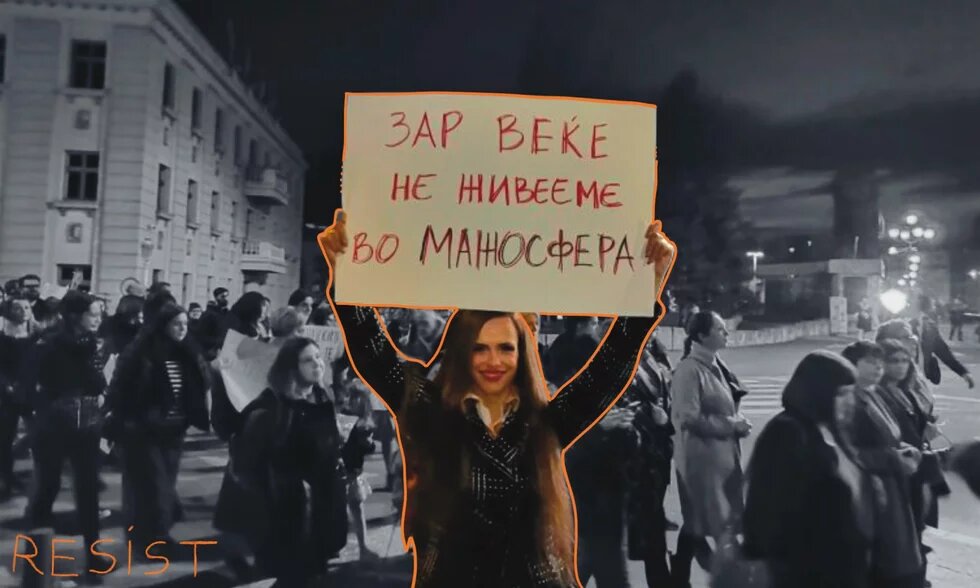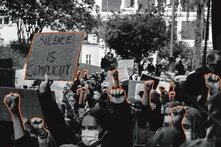Can digital activism replace the power of in-person protests? In North Macedonia, dwindling protest numbers and rising anti-gender movements challenge the fight for gender equality. Activist Sara Milenkovska's insights on the urgent need for solidarity.

The fourth wave of feminism has ushered in an era of digital activism, which serves as a vital tool for global solidarity. Women from across the world can witness and speak out about gender-based violence in places like Afghanistan, Gaza, Lebanon, and elsewhere. This digital platforms allow us to build feminism without borders, pushing toward true transnational solidarity. However, while the digital space offers vast potential, it also presents challenges - especially when it comes to in-person mobilization.
For instance, in 2024 in North Macedonia, the announcement for the annual March 8th protest for women’s rights came late, which significantly reduced turnout, especially among those who are not from Skopje, the capital city. Another significant challenge is the rise of the anti-gender movement which by now is powerful enough to cancel a lecture on gender-affirming surgery at the Faculty of Medicine at the Ss. Cyril and Methodius in University of Skopje. Reports and photos show that the latest protest had lower attendance (a few hundred people) compared to the previous one, (over a thousand of protesters) which, in turn, had significantly higher turnout than the protest held in 2022.
Another perception articulated in feminist circles in North Macedonia is that protesting isn’t necessary. Many hold the opinion that people already have all the rights - voting, financial independence, abortion rights, while some would even say that some women today have more rights than men. However, these are often people who have earned or inherited privileges, such as education or financial stability. But, what rights are we really talking about, and why do people hold this view? To explore these questions, an interview with Sara Milenkovska was conducted. Sara is an activist with a master’s degree in gender, politics, and inequality. As a co-founder of the Stella Network, she is also one of the organizers of the March 8th protest.
"The protest itself, for me, is a political act - one that represents my disagreement with systemic problems and the way they are practiced on an individual level," Sara explains as we begin our conversation.
In the Face of Systemic Violence: Showing up for Human Rights
Sara refers to systemic violence as the various forms of oppression that people face, including when you are unable to report police brutality, or when Roma women don’t have the same access to healthcare as other women. A recent example in North Macedonia shows that after the conservative right-wing party came to power, they proposed amendments to the laws governing primary and secondary education, which would remove terms like "gender equality" and "sexual orientation" as grounds for discrimination. The Platform for Gender Equality has already responded to this, but as of now, there has been no news on whether the amendments will be voted on or not.
“The problem is deeply intersectional and multilayered,” Sara continues. “We need to understand that none of this is accidental. The system is not broken; it is built on a foundation of racism, misogyny and sexism. We need to acknowledge that systemic violence exists through this system and that it is constantly reproduced.”
The act of protest has been one of the most significant throughout history. When people united in the streets, they brought down regimes, took back control in their countries, and regained their rights. Protests can represent solidarity and drive change, no matter what kind of change is needed, but organizing and protesting against this violence is never easy.
We need to acknowledge that systemic violence exists through this system and that it is constantly reproduced.
“You will always have people saying we need to tone down our language, that we should not be so angry,” she adds. “And then there are those who tell you we are not angry enough.”
The activist remembers her days as a student in North Macedonia during the large student protests that occurred at the end of 2014 and were active till the end of the political crises in 2016. Back then, she recalls being beaten by the police - but at the time, she didn’t care about the violence. What mattered to her was what she had to say.
“Now, as I process that violence and other forms of trauma I have experienced, I realize that it was not just about disciplining us. The goal is to make sure people do not show up at protests. Then, there is the debate about which protests are ‘good enough’ - which protests are acceptable and who should be included and everything else: we are told to watch our language, no to express much anger, while at the same time we are never “angry enough” for some people. As activists, we often find ourselves in a position where, in order to make progress, we must roll out a red carpet. Meanwhile, when we protest, we are punished for speaking too openly. In other words, for some, it would be enough if we only held a protest on March 8th and called it activism."
Yet, Sara firmly believes we must continue to protest.
“At the moment, I feel bad that we’re not on the streets, especially given the recent events in Shtip and Negotino - serious situations that are happening on a local level that no one seems to care about,” Sara adds, referring to incidents of femicide and domestic violence that have gone largely unnoticed. At the beginning of November, a 29-year-old woman from Shtip was strangled to death by her ex-partner, while in Negotino, a 46-year-old woman was beaten to death by her husband. Women’s rights NGOs argued that both cases were documented improperly, insisting that they should both be recognized as femicides.
Another challenge for the movement is how it communicates with different groups of people, like people who speak other languages or people with different educational backgrounds. Sara points out that only recently have speeches been made available in Albanian and Roma languages - but this is, according to her, still somewhat delayed.
“The language we use should be critical, direct, and call for action. Sure, the advocacy laws and reforms are important, but who are we addressing with them? We need to address why people don’t feel connected to the cause,” she stresses.
How to foster feminist solidarity further?
For Sara the key to creating meaningful change is to work together every day, to stay connected, and to make sure we’re all checking in on each other. She admits she’s worried about the years to come, especially as conservative parties gain power globally. Sara expresses concern for North Macedonia, as well, given the fact that the conservative party regained power in June last year. This party was responsible for the regime prior to 2016, which sparked student and mass civil protests against its policies.
“In times like this, the biggest lie is that women who live in ‘comfort’ think they are protected from patriarchy and inequality,” she notes. “That illusion can be shattered by something as simple as a pregnancy - something like that, today, can still cost a woman her job”, she points out as in most countries, including North Macedonia, fathers are not entitled to parental leave which places the burden on women to leave work when having a child.
Sara doesn’t believe protests alone are enough, but she does see them as crucial.
“I think we need to approach this as a process of growth and maturation,” she says. “We need to look at these challenges as opportunities for The Platform for Gender Equality and movements to grow - because as we face these struggles, we’re starting to understand where have we gone wrong and what needs to change.”
We need to address why people don’t feel connected to the cause
Protests are not just necessary - they are urgent. As Sara puts it, the time to protest is now.
“I believe that everyday actions are the best way to communicate our message,” she says. “Every event, every gathering, every anonymous meeting with mentors where we talk about issues like menopause - every space where we are together is an opportunity to communicate the importance of these topics.”
“That is why,” she adds, “March 8th is just the beginning for me. Over the next few months, I want to continue talking about why it’s so important for us to speak up, to check in on each other, and not pretend everything is fine when it is not.”
While she acknowledges that there is still much work to be done in terms of collective self-reflection and how the community can better connect and support each other, she recognizes potential in the collective action of the feminist movement.
“I think that once we understand that we are not doing this just for ourselves, we will realize that it is not just about showing up and ticking a box,” she says. “I am here because I care about you. I am here for the future. We are here together to create a better society. My biggest fear right now is that the systemic violence being produced by the new fascist governments - both globally and in Macedonia - is normalizing violence to the point where we will constantly need to protect ourselves and be always on alert“.
To keep that watch, people would need to move a bit away from their digital meet-ups and start meeting in person again.
“We need to find ways to reconnect, to support each other. We need to know that we are not alone in what comes next”, Sara concludes.

